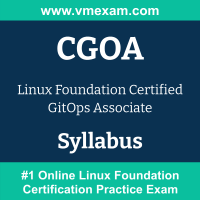 The Linux Foundation CGOA exam preparation guide is designed to provide candidates with necessary information about the GitOps Associate exam. It includes exam summary, sample questions, practice test, objectives and ways to interpret the exam objectives to enable candidates to assess the types of questions-answers that may be asked during the Certified GitOps Associate (CGOA) exam.
The Linux Foundation CGOA exam preparation guide is designed to provide candidates with necessary information about the GitOps Associate exam. It includes exam summary, sample questions, practice test, objectives and ways to interpret the exam objectives to enable candidates to assess the types of questions-answers that may be asked during the Certified GitOps Associate (CGOA) exam.
It is recommended for all the candidates to refer the CGOA objectives and sample questions provided in this preparation guide. The Linux Foundation GitOps Associate certification is mainly targeted to the candidates who want to build their career in DevOps & Site Reliability domain and demonstrate their expertise. We suggest you to use practice exam listed in this cert guide to get used to with exam environment and identify the knowledge areas where you need more work prior to taking the actual Linux Foundation Certified GitOps Associate exam.
Linux Foundation CGOA Exam Summary:
|
Exam Name
|
Linux Foundation Certified GitOps Associate (GitOps Associate) |
| Exam Code | CGOA |
| Exam Price | $250 USD |
| Duration | 90 minutes |
| Number of Questions | 60 |
| Passing Score | 75% |
| Schedule Exam | Linux Foundation |
| Sample Questions | Linux Foundation CGOA Sample Questions |
| Recommended Practice | Certified GitOps Associate (CGOA) Practice Test |
Linux Foundation GitOps Associate Syllabus:
| Section | Objectives | Weight |
|---|---|---|
| GitOps Terminology |
- Continuous - Declarative Description - Desired State - State Drift - State Reconciliation - GitOps Managed Software System - State Store - Feedback Loop - Rollback |
20% |
| GitOps Principles |
- Declarative - Versioned and Immutable - Pulled Automatically - Continuously Reconciled |
30% |
| Related Practices |
- Configuration as Code (CaC) - Infrastructure as Code (IaC) - DevOps and DevSecOps - CI and CD |
16% |
| GitOps Patterns |
- Deployment and Release Patterns - Progressive Delivery Patterns - Pull vs. Event-driven - Architecture Patterns (in-cluster and external reconciler, state store management, etc.) |
20% |
| Tooling |
- Manifest Format and Packaging - State Store Systems (Git and alternatives) - Reconciliation Engines (ArgoCD, Flux, and alternatives) - Interoperability with Notifications, Observability, and Continuous Integration Tools |
14% |
